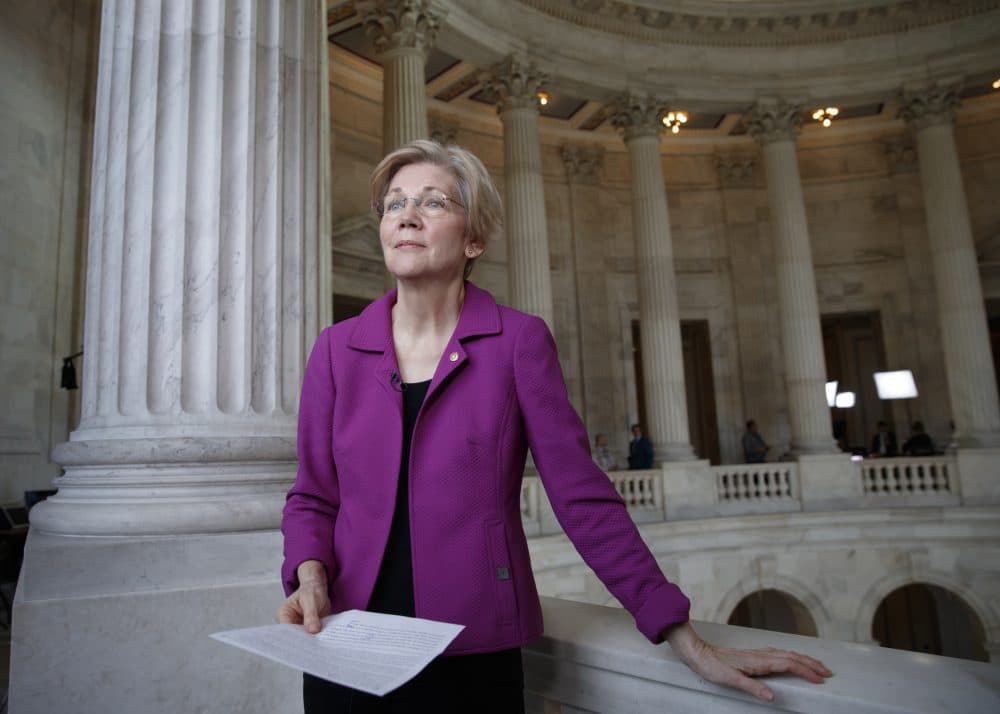Advertisement
In Trying To Silence Warren's Opposition To Sessions, Senate Republicans Handed Her A Megaphone

The Senate confirmed Jeff Sessions Wednesday night as the country's next attorney general, despite opposition from Democrats — most notably, from Massachusetts Sen. Elizabeth Warren.
Republicans used a rarely invoked Senate rule to silence Warren during debate over Sessions' nomination on the Senate floor Tuesday, but in doing so they handed her a megaphone to make her case against Sessions even louder.
The fight began Tuesday night when Warren quoted the late Sen. Ted Kennedy, who back in 1986 opposed Sessions' nomination to become a federal judge.
" 'He is, I believe, a disgrace to the Justice Department and he should withdraw his nomination and resign his position.' Those were the words of Sen. Ted Kennedy," Warren said.
Then Warren read a letter written 30 years ago by Corretta Scott King, the widow of Rev. Martin Luther King Jr. Scott King wrote the letter to voice her opposition with Sessions' 1986 nomination. The letter criticizes Sessions' record as U.S. attorney for prosecuting civil rights workers who were trying to help blacks vote. That's when Senate Majority Leader Mitch McConnell stepped forward to shut Warren down.
"Sen. Warren, quote, said, 'Sen. Sessions has used the awesome power of his office to chill the free exercise of the vote of black citizens.' I call the senator to order under the provisions of Rule 19," McConnell said.
Rule 19 prohibits senators from ascribing "to another Senator or to other Senators any conduct or motive unworthy or unbecoming a Senator."
Then, in a dramatic rebuke, the Senate voted along party lines to silence Warren for the rest of the debate. She had to leave the Senate floor, but that hardly muzzled her. Far from it. She continued to read King's letter in the Senate hall, she talked about it on CNN, on Facebook and on Twitter, where #LetLizSpeak has been trending.
"One of the points that Coretta Scott Kings made in her letter is that Jeff Sessions managed with his federal prosecution to do what the local sheriffs accomplished 20 years ago with clubs and cattle prods," Warren told WBUR's Radio Boston Wednesday.
Advertisement
Warren says without the power to block President Trump's appointments, Democrats must at least raise the alarm about who will be running the government.
But that Senate Republicans used an obscure rule to try to silence her is a sign of just how toxic the political climate has become in Washington — even in the once relatively decorous Senate. That's according to Sarah Binder, a professor of political science at George Washington University and a senior fellow at the Brookings Institution.
"By and large the Senate works things out, and they never push it to a vote," Binder said. "That's what so different about the casting of a vote and silencing a sitting senator to sit down, which of course just further inflames the partisanship."
The Senate adopted Rule 19 more than 100 years ago — after a fist fight on the Senate floor — and Binder says that was probably the last time it was invoked until this week. She says the latest partisan skirmish will only make division in the Senate worse — especially when Republicans start trying to pass legislation.
"They are going to need Democratic votes because typically you need 60 votes to get much done," she said. "Every time they have these altercations with the Democrats it just poisons the well such that Democrats will be less and likely to want to play ball."
Jeff Stinson agrees with that. He's a Boston-based Republican political consultant who says the leaders of his party in the Senate made a mistake by falling into what he says was a trap set by Warren.
"Mitch McConnell and the others in the Senate essentially made this the number one story out there, which means that everyone is going to be talking about this letter, what it means to Jeff Sessions, what it means to his character and what it means to his ability and fitness to be the attorney general of the United States," Stinson said.
Stinson says this story continues to elevate Warren as one of Washington's fiercest liberals — and a lawmaker who is among the least willing to compromise with Republicans. He says that might come with some risks for Warren.
"And I'm not saying that's a bad tactic," he said. "I'm just saying it may not sit well with folks at home who are really frustrated with the climate down in D.C."
That will no doubt be a Republican line in the campaign to try to unseat Warren. But this week, she doubled down on her role as one of the toughest critics of Senate Republicans and President Trump.
This article was originally published on February 08, 2017.
